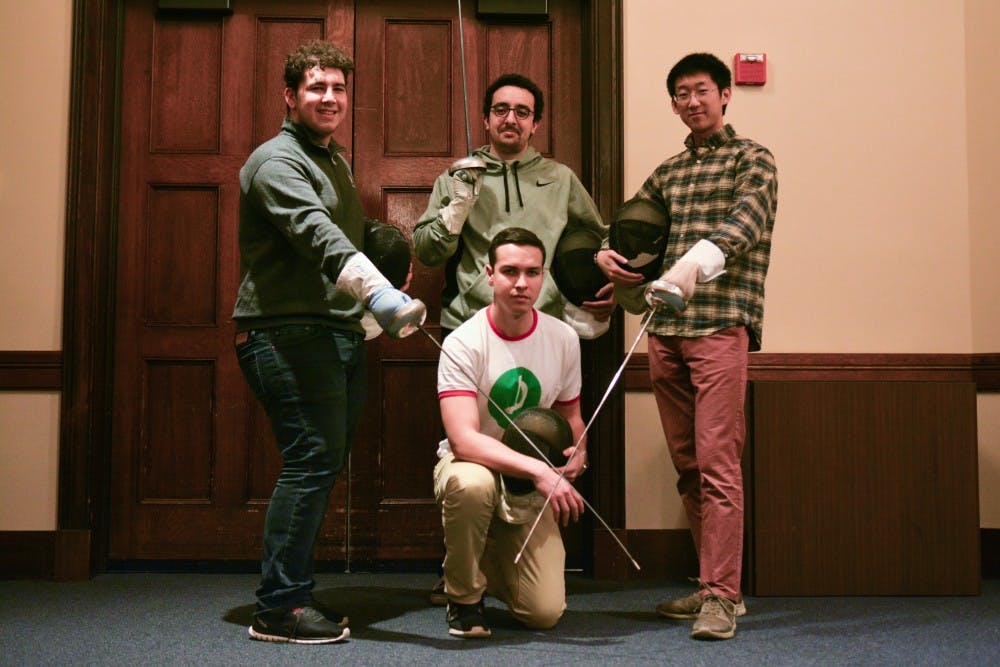
Penn's varsity fencing teams are some of the strongest in the Ivy League and also some of the most competitive to get into. While the men's team took home the Ivy League Championship over the weekend, another group of fencing enthusiasts at Penn were participating in the sport in a more casual way.
Three Penn sophomores, Max Norleans, Mustafa Salim, and Chetan Parthiban, launched the Penn Fencing Club last semester for students who are interested in the sport but cannot afford to train multiple times a week.
Wharton sophomore Max Norleans said that when he started attending Penn, he expected to find a fencing club but found that it did not exist.
“There was either hardcore fencers or people that just don’t fence anymore," he said. "So I [thought] ‘this is not hard. We’ll just start our own club.’”

College sophomore Mustafa Salim agreed, adding that he and Norleans had fenced before college and wanted to continue doing so in a casual setting.
Penn Fencing Club welcomes those with every level of fencing background. While the club's main objective is to allow people to continue fencing non-competitively, the club is also open "for anyone who’s interested in trying out fencing," Norleans said. "It’s a place for new people to come and learn about the sport, see if they’re interested, and go from there.”
The club has no dues, no application, and no attendance requirements. Currently, members provide their own equipment, though Salim said he hopes the club can get funding from the Student Activities Council next semester to provide equipment for new members.
Close to half of the more than 450 student-run clubs and groups at Penn rely in part on the Student Activities Council for funding.
The formation of the Penn Fencing Club comes amid a series of efforts undertaken by students to work against the University's supposedly "hypercompetitive" club culture.
Last year, students created the UPenn Game Research and Development Environment, a programming club that takes in anyone who is willing to join, without an application. In the same semester, the Penn Improv Society launched its recruitment efforts with three guarantees: no applications, no interviews, and no experience necessary.
By opening up their clubs to all who want to join, these students provide an alternative space to students who feel alienated by other groups on campus, some of which have acceptance rates below 10 percent.
Although the founders of the Penn Fencing Club were its only members at the beginning, other students have started joining through word of mouth. Recent sessions have averaged eight members, but Norleans believes the current practice space, Irvine Auditorium, can accommodate plenty more.
“So far, it’s a really small, intimate group. We all know each other; we’re all friends," Salim said. "We’re starting to get a lot more newer members that we’re not really that close to, but it’s nice, ‘cause now we’re starting to branch out more.”
Norleans said Penn Fencing Club differs from many clubs at Penn in terms of the community it offers.
“A lot of clubs have a board and all these leadership positions: a hierarchy," Norleans said. "Right now, we don’t really need that.”
College junior Andres Fernandez Pallares recently joined the club.
“[The varsity fencing team] is a solid almost-20-hour investment per week, which I couldn’t do," he said.
Fernandez Pallares also said he thinks more students should consider trying the activity.
“I think it’s a wonderful sport," he said. "Like a lot of Eastern martial arts, it teaches you a lot about discipline and self control, knowing what to do with your body, a lot of strength, endurance, speed.”
Norleans agreed. “For an hour or an hour and a half, just meet some people, get your mind off school, just have some fun stabbing each other."
The Daily Pennsylvanian is an independent, student-run newspaper. Please consider making a donation to support the coverage that shapes the University. Your generosity ensures a future of strong journalism at Penn.
Donate



